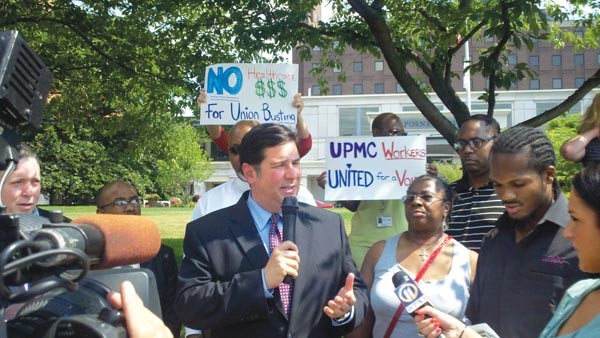After being told for weeks that he couldn't talk about efforts to bring a union to UPMC while on hospital property, Chaney Lewis wasn't going to let this chance pass.
Lewis, of Edgewood, has worked for the past eight years transporting patients at UPMC Presbyterian. On June 20, he was standing before the board of UPMC Shadyside hoping to move along another message to UPMC brass: Let the union-organizing process proceed fairly.
"All I want to do is exercise my right as a citizen to talk to my co-workers about the option of forming a union," says Lewis. "If the union comes, it comes. If it doesn't, well that's all right, too. But please, let's just play fairly."
Lewis, along with Pittsburgh City Councilor Bill Peduto, City Controller Michael Lamb, members of the clergy and UPMC employees, held a rally outside of UPMC Shadyside before marching to the board's meeting inside the hospital.
UPMC, the area's largest employer with about 50,000 workers, is actively trying to fight off unionization efforts by the Service Employees International Union. Union organizers have been passing out cards and asking employees to sign them to force a vote on unionization.
But the regional health-care giant has been swinging back, according to union officials, by employing a union-busting company. And Lewis says employees are constantly given anti-union messages in the form of literature and so-called captive-audience meetings during working hours.
In May, the SEIU Healthcare Pennsylvania filed a complaint with the National Labor Relations Board alleging that UPMC has "interfered with, restrained and coerced employees," who were seeking to unionize. Specifically, the complaint charges that UPMC "[s]urveilled, interrogated and intimidated employees with respect to their support for the union and their union activities," and threatened to fire employees for discussing unionization "while permitting anti-union speech and activity."
"They're pulling us away from caring for the patients and doing our jobs," says employee Charlene Hampton, of East Liberty. "They can talk against unionizing all they want but we're not allowed to talk about the benefits of it."
Some of the benefits would be higher wages and regular salary increases. Lewis, for example, says he worked at UPMC for six years before his salary was increased (a 2.5 percent increase on top of his roughly $9-an-hour job). "I almost got a raise in my fifth year," he told the Shadyside board. "But there was a wage freeze."
In an email to City Paper, Gloria Kreps, director of media relations for UPMC, issued a statement about the recent unionization effort.
"UPMC cares about our employees and we respect their lawful right to choose or reject union representation," the statement reads. "However, we believe that unionization is not in the best interest of our employees or the patients we serve.
"We prefer to interact with our employees directly rather than through a third party and we encourage collaboration to solve problems and maintain good working environments."
Kreps also included a series of letters sent to employees from Leslie Davis, president of Magee's Women's hospital, and John Innocenti, president of UPMC Shadyside and Presbyterian. The letters address issues of unionization including the company's take on the collective-bargaining process and future wages.
One letter, signed by Davis, is titled "job security." It reads, in part: "Job security comes from a close-knit team working together for a common goal. Who is on that team? YOU are a very important part of the team."
The letter continues, "The SEIU could and likely would protect members of the union who are less productive and less skilled at their jobs simply because they are in the union. The SEIU would place seniority above performance."
In addition to the letters, UPMC created a website (www.UPMCcares.com) to disseminate information to employees and the public.
Because of the size of its workforce, unionizing potentially tens of thousands of UPMC employees would necessarily have an impact on the region. That's why Councilor Peduto says it's important to make sure the process is handled correctly.
"The factories that defined this region didn't go away," Peduto told the Shadyside board, "they just moved up the street to Oakland and Shadyside.
"These workers have to be given the opportunity to meet and discuss their options. All I'm asking for is a fair process."















